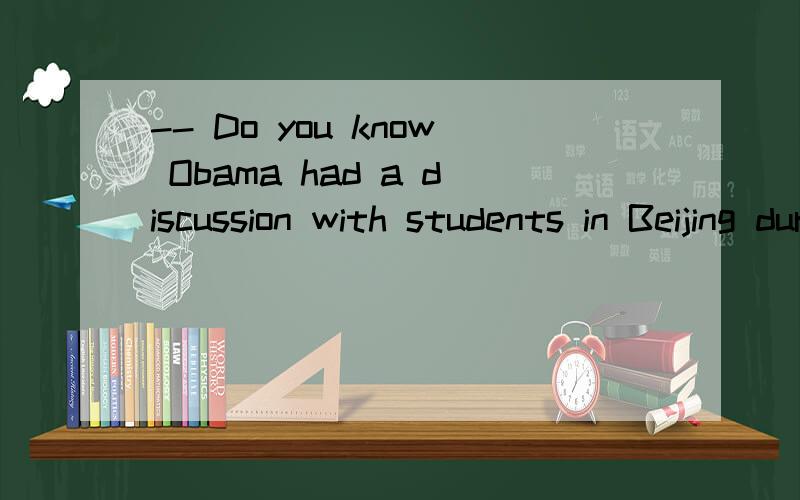-- Do you know Obama had a discussion with students in Beijing during his state visit to China?--Really?If I ___ a chance like this,I would feel extremely excited.A have B will have C had D has改错 If I have had enough money,Iwould have traveled ev
来源:学生作业帮助网 编辑:作业帮 时间:2024/11/20 14:20:19

-- Do you know Obama had a discussion with students in Beijing during his state visit to China?--Really?If I ___ a chance like this,I would feel extremely excited.A have B will have C had D has改错 If I have had enough money,Iwould have traveled ev
-- Do you know Obama had a discussion with students in Beijing during his state visit to China?
--Really?If I ___ a chance like this,I would feel extremely excited.
A have B will have C had D has
改错 If I have had enough money,Iwould have traveled everywhere.
-- Do you know Obama had a discussion with students in Beijing during his state visit to China?--Really?If I ___ a chance like this,I would feel extremely excited.A have B will have C had D has改错 If I have had enough money,Iwould have traveled ev
先给你讲讲虚拟语气
一、与现在事实相反
若与现在事实相反,虚拟语气的条件从句的谓语用过去式(be通常用were),主句谓语用“should (would,could,might)+动词原形”.如:
If you took a taxi,you'd get there quicker.如果你坐出租车去,你可以快一点到那里.(但你不坐)
If I knew her number I could ring her up.要是我知道她的电话号码,我就可以给她打电话了.(可惜我不知道)
二、与过去事实相反
若与过去事实相反,虚拟语气的条件从句的谓语用过去完成时(had+过去分词),主句谓语用“should (would,could,might)+have+过去分词”.如:
If I'd left sooner,I'd have been on time.要是我早点动身,我就准时到了.(但我动身太迟了)
If we had found him earlier we could have saved his life.要是我们当时早点找到他的话,我们就可以救活他.(可惜我们找到他太晚了)
三、与将来事实相反
若与将来事实相反,条件从句的谓语用过去式(be通常用were),主句谓语用“should (would,could,might)+动词原形”.如:
If he went,would you go too?如果他去,你也去吗?(大概他不会去)
If I asked him,I'm sure he'd help us.如果我向他提出要求,肯定他会帮助我们.(不过我不打算这样做)
注意与说明:对于与将来事实相反的情形,请注意以下几点:
一是这里说的与将来事实相反,实为对将来情况的推测;
二是此用法中的条件从句谓语除用过去式外,有时也用“should+动词原形”(表示可能性极小,常译为“万一”)或“were to+动词原形”(表示与将来事实相反的假设);
三是当条件从句使用“should+动词原形”这样的谓语时,主句谓语除可用“should (would,could,might)+动词原形”这样的虚拟语气外,也可用陈述语气或祈使语气.如:
I should see him,I'll tell him.万一我见到他,我就告诉他.
If it should rain tomorrow,don’t expect me.万一明天下雨,就别等我了.
改错 If I have had enough money,Iwould have traveled everywhere
与现在事实相反 故 If I had enough money,Iwould have traveled everywhere
学弟,懂不懂呀?
1. 对过去时态的虚拟,用过去完成时
If I have had enough money,Iwould have traveled everywhere
如果我当时有足够多的钱,我就会周游各地。
第三个单词have 改为had
先给你讲讲虚拟语气
一、与现在事实相反
若与现在事实相反,虚拟语气的条件从句的谓语用过去式(be通常用were),主句谓语用“should (would, could, might)+动词原形”。如:
If you took a taxi,you'd get there quicker. 如果你坐出租车去,你可以快一点到那里。(但你不坐)
If I knew her...
全部展开
先给你讲讲虚拟语气
一、与现在事实相反
若与现在事实相反,虚拟语气的条件从句的谓语用过去式(be通常用were),主句谓语用“should (would, could, might)+动词原形”。如:
If you took a taxi,you'd get there quicker. 如果你坐出租车去,你可以快一点到那里。(但你不坐)
If I knew her number I could ring her up. 要是我知道她的电话号码,我就可以给她打电话了。(可惜我不知道)
二、与过去事实相反
若与过去事实相反,虚拟语气的条件从句的谓语用过去完成时(had+过去分词),主句谓语用“should (would, could, might)+have+过去分词”。如:
If I'd left sooner,I'd have been on time. 要是我早点动身,我就准时到了。(但我动身太迟了)
If we had found him earlier we could have saved his life. 要是我们当时早点找到他的话,我们就可以救活他。(可惜我们找到他太晚了)
三、与将来事实相反
若与将来事实相反,条件从句的谓语用过去式(be通常用were),主句谓语用“should (would, could, might)+动词原形”。如:
If he went,would you go too? 如果他去,你也去吗?(大概他不会去)
If I asked him,I'm sure he'd help us. 如果我向他提出要求,肯定他会帮助我们。(不过我不打算这样做)
注意与说明:对于与将来事实相反的情形,请注意以下几点:
一是这里说的与将来事实相反,实为对将来情况的推测;
二是此用法中的条件从句谓语除用过去式外,有时也用“should+动词原形”(表示可能性极小,常译为“万一”)或“were to+动词原形”(表示与将来事实相反的假设);
三是当条件从句使用“should+动词原形”这样的谓语时,主句谓语除可用“should (would, could, might)+动词原形”这样的虚拟语气外,也可用陈述语气或祈使语气。如:
I should see him, I'll tell him. 万一我见到他,我就告诉他。
If it should rain tomorrow, don’t expect me. 万一明天下雨,就别等我了。
改错 If I have had enough money,Iwould have traveled everywhere
与现在事实相反 故 If I had enough money,Iwould have traveled everywhere
对过去时态的虚拟,用过去完成时
If I have had enough money,Iwould have traveled everywhere
如果我当时有足够多的钱,我就会周游各地。
第三个单词have 改为had
最佳回答选我吧!
收起
选c 。have改为had。
虚拟语气:
if 引导的条件状语从句。
1.真实条件状语从句:
if+一般现在时,主句+一般将来时或有情态动词的一般现在时。
例:If it is fine tomorrow, we shall go for a swim.
2.非真实条件状语从句:
a.对现在的假设。
...
全部展开
选c 。have改为had。
虚拟语气:
if 引导的条件状语从句。
1.真实条件状语从句:
if+一般现在时,主句+一般将来时或有情态动词的一般现在时。
例:If it is fine tomorrow, we shall go for a swim.
2.非真实条件状语从句:
a.对现在的假设。
if 引导的从句 主句
动词要用过去式,be只能用were。 主语+would/could/should/might+do
例:If father were alive, he could be horrified.
b.对将来的假设。
were to / should do 主语+would/could/should/might+do
例:If you should take part in the speech contest, I might join in it,too.
c.对过去的假设。
had done 主语+would/could/should/might+have done
例:If you had told me about it earlier, I would have been able to help you.
收起